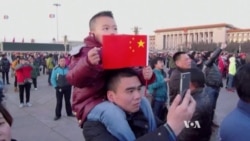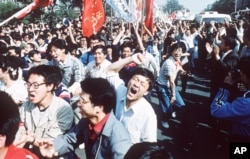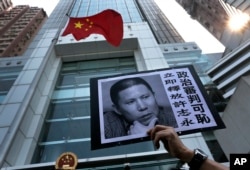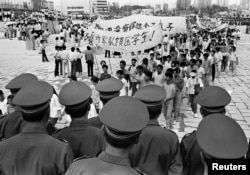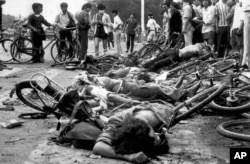BEIJING —
It has been 25 years since China's crackdown on pro-democracy demonstrations in Tiananmen Square. China's leadership has taken great steps to silence any discussion of the events of 1989, the massive protest rallies that took place that spring in Beijing and other cities and the bloody crackdown that followed. Even so, the demands of the students and citizens who poured out onto the streets at that time have not gone away.
In the spring of 1989, Fang Zheng was an aspiring track and field athlete at a Beijing university. Like many of his classmates, he went to Tiananmen Square to voice his concern about a range of issues from official corruption to freedom of the press.
Fang Zheng says that in the 1980s, hopes for reform were high and many joined the Communist Party to try to create a better future for the country.
He says "university students in the 80s all had a similar attitude and were all very idealistic." They also had "strong sense of social responsibility and concern for the fate of the country."
Fang Zheng says many at that time were influenced by then leader of the Soviet Union, Mikhail Gorbachev, and his reform policies. He says that he and other students took their demands to Tiananmen Square in the hope that it would help China change as well.
That all changed early on the morning of June 4, when Fang Zheng became a firsthand witness and victim of the government's crackdown. A tank rolled over both of the young athlete's legs and lopped them off.
Instead of responding to the public's demands, Fang Zheng says, the government "used guns, repression and blood to cement their authority" and respond to the protesters.
During the Tiananmen protests in 1989, one of the seven demands of the students was for officials and their family members to disclose their income, another was for the right to freely hold demonstrations in Beijing.
Today, a quarter of a century later, those two aspirations remain distant goals.
Assets off the table
Chinese President Xi Jinping's sweeping anti-corruption campaign has netted both high and low-ranking officials. But, his administration has rejected calls for the Chinese leadership to release information to the public, such as their salaries and the number of apartments and cars they own.
When individuals, such as lawyer Xu Zhiyong, have challenged that position they have ended up in jail. Xu and several other members of a loosely organized group called the New Citizens Movement were jailed earlier this year for trying to rally support for assets disclosure.
Senior Hong Kong journalist Ching Cheong says that while China's President Xi Jinping has launched sweeping efforts to reform China's economy and government bureaucracy, he has been silent on political reform and addressing the basic desires of the Chinese public.
"And what do the people desire? People want a separation of power, people want to have a check and balance on the exercise of power, and people want to have all the constitutional rights that they are entitled to," he said.
Freedom of assembly
Protests are not uncommon and are a guaranteed right under China's constitution, as long as they do not infringe on the interests of the state. And because of that, the way the Chinese government responds to public dissent varies widely.
Recently, thousands rallied in the eastern Chinese city of Hangzhou to protest the construction of a waste incinerator. Clashes with authorities escalated into violence, cars were overturned and police vehicles torched.
State-media say some 60 individuals have been detained, but local authorities have also pledged to not move forward on the project without public support.
That approach contrasts with how authorities treat activists such as Xu Zhiyong and other members of the New Citizens Movement, who have held peaceful public gatherings to require officials to disclose their assets. The demonstrators have been sentenced to prison for gathering crowds to create a disturbance.
No room for dialogue
Andrew Nathan, a political scientist at Columbia University says that although pressure is building in China for the government to engage in dialogue on sensitive issues, the most common response is to focus on stability and the silencing of dissent.
Nathan says that when students and workers gathered in Beijing in 1989, what they were seeking was dialogue with the government, not to overthrow the party.
" In [19]89, the government, the ruling party, really decided if we dialogue with you lot, I mean there is no knowing what you are going to start demanding from us and then we are not going to be authoritarian rulers anymore. That's not our system. So they refused to do it. They are still in that refusal stage 25 years later," he said.
China's official stance on Tiananmen is that it was a counter-revolutionary rebellion. And while the government faces annual calls to open an inquiry into what happened in the spring of 1989, there is no sign that it will change its approach anytime soon.
This report is also based in part on news wires.
In the spring of 1989, Fang Zheng was an aspiring track and field athlete at a Beijing university. Like many of his classmates, he went to Tiananmen Square to voice his concern about a range of issues from official corruption to freedom of the press.
Fang Zheng says that in the 1980s, hopes for reform were high and many joined the Communist Party to try to create a better future for the country.
He says "university students in the 80s all had a similar attitude and were all very idealistic." They also had "strong sense of social responsibility and concern for the fate of the country."
Fang Zheng says many at that time were influenced by then leader of the Soviet Union, Mikhail Gorbachev, and his reform policies. He says that he and other students took their demands to Tiananmen Square in the hope that it would help China change as well.
That all changed early on the morning of June 4, when Fang Zheng became a firsthand witness and victim of the government's crackdown. A tank rolled over both of the young athlete's legs and lopped them off.
Instead of responding to the public's demands, Fang Zheng says, the government "used guns, repression and blood to cement their authority" and respond to the protesters.
During the Tiananmen protests in 1989, one of the seven demands of the students was for officials and their family members to disclose their income, another was for the right to freely hold demonstrations in Beijing.
Today, a quarter of a century later, those two aspirations remain distant goals.
Assets off the table
Chinese President Xi Jinping's sweeping anti-corruption campaign has netted both high and low-ranking officials. But, his administration has rejected calls for the Chinese leadership to release information to the public, such as their salaries and the number of apartments and cars they own.
When individuals, such as lawyer Xu Zhiyong, have challenged that position they have ended up in jail. Xu and several other members of a loosely organized group called the New Citizens Movement were jailed earlier this year for trying to rally support for assets disclosure.
Senior Hong Kong journalist Ching Cheong says that while China's President Xi Jinping has launched sweeping efforts to reform China's economy and government bureaucracy, he has been silent on political reform and addressing the basic desires of the Chinese public.
"And what do the people desire? People want a separation of power, people want to have a check and balance on the exercise of power, and people want to have all the constitutional rights that they are entitled to," he said.
Freedom of assembly
Protests are not uncommon and are a guaranteed right under China's constitution, as long as they do not infringe on the interests of the state. And because of that, the way the Chinese government responds to public dissent varies widely.
Recently, thousands rallied in the eastern Chinese city of Hangzhou to protest the construction of a waste incinerator. Clashes with authorities escalated into violence, cars were overturned and police vehicles torched.
State-media say some 60 individuals have been detained, but local authorities have also pledged to not move forward on the project without public support.
That approach contrasts with how authorities treat activists such as Xu Zhiyong and other members of the New Citizens Movement, who have held peaceful public gatherings to require officials to disclose their assets. The demonstrators have been sentenced to prison for gathering crowds to create a disturbance.
No room for dialogue
Andrew Nathan, a political scientist at Columbia University says that although pressure is building in China for the government to engage in dialogue on sensitive issues, the most common response is to focus on stability and the silencing of dissent.
Nathan says that when students and workers gathered in Beijing in 1989, what they were seeking was dialogue with the government, not to overthrow the party.
" In [19]89, the government, the ruling party, really decided if we dialogue with you lot, I mean there is no knowing what you are going to start demanding from us and then we are not going to be authoritarian rulers anymore. That's not our system. So they refused to do it. They are still in that refusal stage 25 years later," he said.
China's official stance on Tiananmen is that it was a counter-revolutionary rebellion. And while the government faces annual calls to open an inquiry into what happened in the spring of 1989, there is no sign that it will change its approach anytime soon.
This report is also based in part on news wires.




